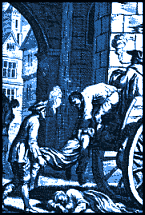
The plague in Presteigne
The terrors of the plague
Early prosperity
It is thought that the granting of a weekly Saturday market to
Presteigne probably dates from the middle of the 13th century.
The town seems to have become relatively prosperous by the end
of the century, with an estimated population of around 350 inhabitants.
The economic growth of the town, however,
was to be badly hit by a series of bubonic plague epidemics in
the second half of the 14th century which
ravaged much of Europe. These were chiefly caused by the primitive
sanitation of the times, with open sewers and overcrowding in
the towns. The disease was rapidly spread by rat fleas, and those
bitten quickly succumbed and their chances of survival were very
slender.
which
ravaged much of Europe. These were chiefly caused by the primitive
sanitation of the times, with open sewers and overcrowding in
the towns. The disease was rapidly spread by rat fleas, and those
bitten quickly succumbed and their chances of survival were very
slender.
The Black Death
The earliest of the major outbreaks, the infamous "Black
Death" of 1349-50, had spread throughout Europe and is believed
to have caused the deaths of around one third of the population
of England and Wales. The Black Death was so called because of
the black spots of dried blood that appeared under the skin of
victims.
There were further serious outbreaks of the plague at intervals
between 1360 and 1390, and the epidemic of 1349-50 was recorded
as having ‘swept away over half the population’ of
the diocese of Hereford.
There are 3 pages on the plague in Presteigne. Use the box links below to view the other pages.